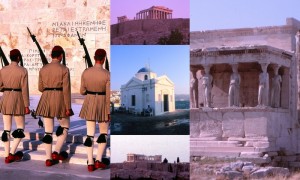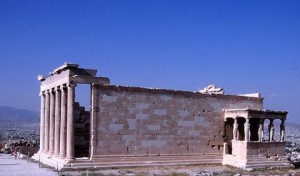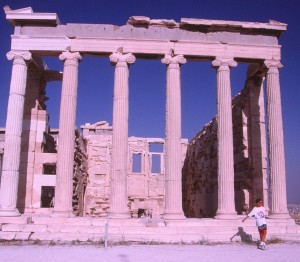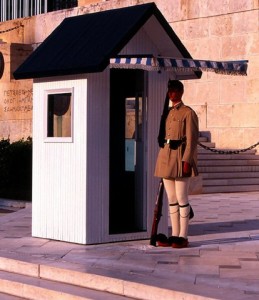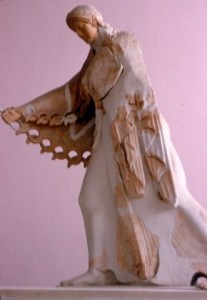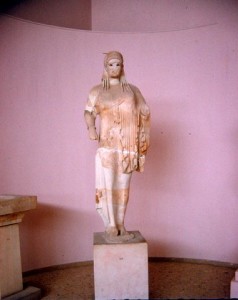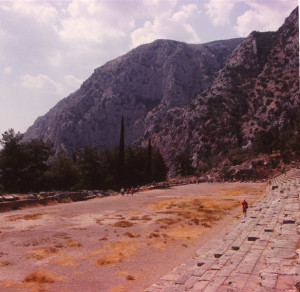We first discussed visiting Greece around the dinner table when our youngest son was studying Ancient History in school. My family laughs at my insistence on researching our vacations before planning the itinerary, but that method has led us to some amazing trips.
Trying to satisfy 3 people with different interests was not an easy task. Michael was excited about visiting the ruins at Mycenae and Ancient Olympia. Jim was also interested in the ruins and especially, the Acropolis in Athens. I certainly wanted to see the Acropolis and in particular, the Parthenon. Having been raised in Nashville, Tennessee, I spent many an afternoon as a small child playing among the pillars of the life size replica of the Parthenon in Centennial Park. Greece has excellent prices on gold jewelry so a shopping excursion in the Plaka in Athens was added to the list. But in the midst of all the research, I realized an important fact about Greece.
Paul the Apostle plays an important role in our Christian faith. Paul spread the word of Christianity throughout Greece and was often incarcerated for his beliefs. My research showed that we could incorporate a few of Paul’s stops in our own itinerary.
Paul preached in Athens, making friends and enemies. He preached to the people in the synagogue and spoke for days with philosophers in the Agora. The High Court (Areogagus), which was the most prestigious court in the city, allowed him to preach to the Athenians on the hill, also named Areogagus, on the West side of the Acropolis. We could easily include those stops on our tour.
In Ancient Corinth, Paul fought against the corrupt Corinthians for years, making several mission trips there to try and convince the people to turn from their wicked ways. He established a large church in Corinth before being run out of town. So…ancient Corinth would be next as we made our way over to the Peloponessus.
From Corinth, Paul headed to Epidavros.
Because of the research, I found what really mattered to me for our vacation, and was able to plan based on everyone’s wishes.
We left Nashville, flying to Atlanta, then on to Frankfurt, Germany, and Athens. We planned to spend 3 nights in Athens, then rent a car and drive across the Isthmus of Corinth to the Peloponnese Peninsula. Once there, we would stop in Ancient Corinth, move on to Epidavros and then Nafplio for the night. Next day, we would complete our short stay in Nafplio by visiting the Palomidi Fortress and then drive to Mycenae and on to Olympia that night. After a couple of nights in Olympia, we planned to drive North to Patra and cross the Gulf of Corinth to Antirrion on the Mainland. Delphi was our last destination on the circle that would take us back to Athens. With so much packed into a short time, 2 nights back in Athens in a luxury hotel seemed like a necessary extravagance.
Come along with me as I recount our journey in photos. All information is updated, courtesy of Matt Barrett and his excellent website, www.greektravel.com. Matt gave me permission to quote him in this article. This trip actually continued with a Mediterranean cruise to several Greek islands, and that will be the second article in this category.
We stayed at the Herodian Hotel near the base of the Acropolis, a local favorite recommended to me by Phyllis Zeno, then editor of the “AAA Magazine,” as her hotel of choice in Athens. For a very reasonable price, we obtained a pleasant, clean, air conditioned suite just a 2 block walk to the Acropolis.
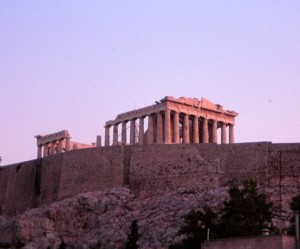
Imagine waking to this view of the Acropolis every morning! With camera in hand, we headed out to spend part of the day going back in time to an era when gods and goddesses ruled the world as they knew it.
Our first stop was the Herod Atticus theater situated below the Acropolis, just a block from the Herodian Hotel where we stayed. The theater built by the Romans in 161 A.D. is still used for classical concerts and special performances. Just a few years ago, we watched a Yanni concert from there on Public Television.
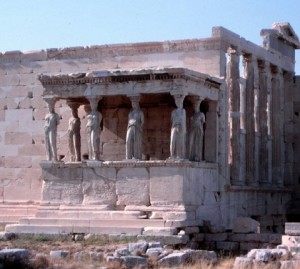
This view of the Caryatids is often photographed and much admired. However, these are replicas on the site of the Acropolis. The originals are in museums.
Today, more than half of the Parthenon sculptures are in the British Museum in London, but there are plenty to see in Athens!
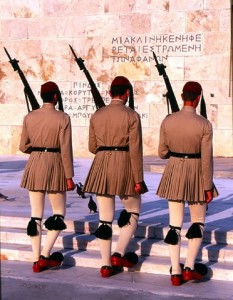
From the Acropolis, we wandered through the Ancient Agora (greatly excavated and improved since our visit) and actually stood on the hill where Paul preached to the people of Athens. More meandering through the area and we ended up in The Plaka.
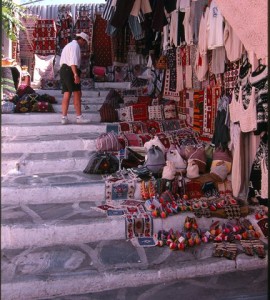
The Plaka is a charming area of cafes, restaurants and shops – lots and lots of shops! Matt Barrett describes The Plaka as “an island within the city.” It certainly is a switch from antiquities to modernity. We enjoyed several good meals in this area, and helped the local economy in a certain jewelry store.
If you are interested in shopping while in Athens, check out Greek gold jewelry. You can never go wrong with gold!
We also spent an afternoon at the National Archeological Museum in Athens. Surrounded by statues and pieces of art from ancient days, we soaked in Greek mythology. Our son was studying Ancient History in school, and the museum was excellent research for him. Exhibits were labeled in both Greek and English.
Because we wanted to experience a bit more of Greek life than a tour would have offered, we rented a car once we were ready to leave Athens. Unless you truly have nerves of steel, I don’t recommend driving in Athens, if you can avoid it. Greece is one of those countries where older Americans still travel safely on their own. Greeks are friendly, welcoming to strangers and willing to help if you get lost.
Should you decide a tour group is best for you, I suggest getting recommendations from friends. Matt Barrett recommended a group on his website, but I don’t have any personal information about it. I can say that if we were to return to Greece today my husband, in his 70’s, would again opt for driving his own vehicle, because we both enjoy taking side trips and stopping where we please.
On the Road to the Peloponnese Peninsula
Jim picked up our rental car from Hertz near our hotel, and we directed our attention to fighting our way out of the city.
After crossing the Isthmus of Corinth, our first stop was Ancient Corinth. The tour of the ruins was interesting, especially, the temple of Apollo built in the 6th Century B.C. Seven columns are all that remain on the site.
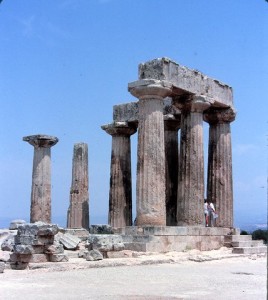
We saw the bema where Paul preached to the Corinthians and also toured the museum.
Lunch followed at a local taverna with gyros made with big chunks of lamb. Delicious!
Next stop – Acrocorinth! Sitting 1900 feet above the city, the spectacular fortress built in ancient times and added to by the Romans, Byzantines, Franks, Venetians and Turks, has been beautifully preserved and captured the imagination of our son as he and Jim climbed the path approaching the fortress. Michael’s Dad bailed on him at one point, but Mike made it all the way to the top.
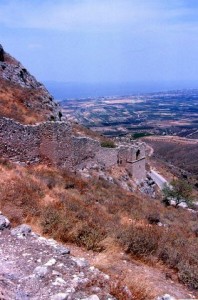
The ancients built temples and sanctuaries on the hill. Originally, the famous temple of Aphrodite dominated the top but was built over during the Middle Ages by the Turks. The temple was once home to over 1,000 prostitutes who were dedicated to Aphrodite. According to the story told us, many tourist came to Acrocorinth and the city became wealthy because of the “efforts”of the prostitutes. From the road below, you can see the remains of a Turkish mosque.
Epidavros was an amazing 3rd Century, outdoor theater that produced Greek tragedies by Euripides, Sophocles, and Aeschylus still operates during a festival in July and August each year. The acoustically-perfect, restored theater is known as the birthplace of Apollo’s son, Asclepius. Asclepius became a physician, and Epidavros was considered an important medical center to the ancient Greeks.
Coronis, mother of Asclepius, was murdered when she slept with another man while carrying Apollo’s child. Perhaps the pregnancy was the issue, since the ancients, both mortals and deities, appeared to use sex indiscriminately, according to mythology. Coronis, which translates to “crow,” was disgraced from that time on, and that is supposed to explain why we don’t treat the bird with reverence today.
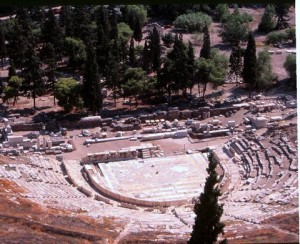
While quite commercial these days and catering to tourists from all over the world, we found Epidavros and its theater fascinating and were glad we included this stop on our self-guided tour.
Next stop, the coastal village of Nafplio. Surrounded by impressive old buildings and backstreets so narrow, a car could barely squeeze past the cafes with outdoor tables and chairs. The large Syntagma, paved in marble, offered dining and shopping opportunities, and we settled in to people-watch.
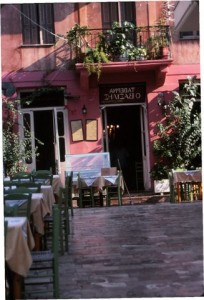
Many complain today about the traffic and congestion in Nafplio, but the little town was a highlight of our trip. The harbor offers a view of the Bourtzi fortress built in 1473 by the Venetians to protect the harbor from pirates. I understand the island is now used as a music venue for the Nafplio Folk Music Festival held in May and June.
Next morning, we headed up to the nearby Palamidi Fortress also built by the Venetians and later held by the Turks.
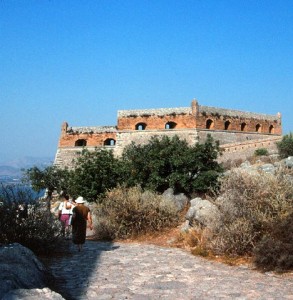
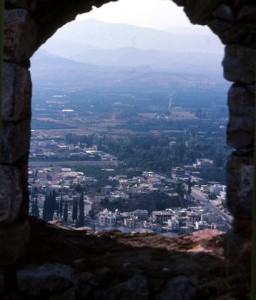
Mycenae
Back on the road, we headed toward Mycenae, touted by Matt Barrett as the “Home of Agememnon, ancient king who united the Greeks during the Trojan War.” This ancient site was without a doubt, our son’s favorite of the Greek ruins on the Peloponessos. The city of Mycenae dates back to 5000 B.C., and there is a strong Egyptian influence. The poet Homer connected Mycenae to Egypt in his writing.
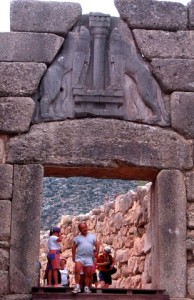
On his website, Barrett says that “Lion’s Gate is the oldest monumental sculpture in Europe and is said to be the coat of arms of Atreus, mythical king of Mycenae.”
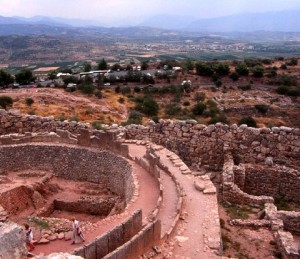
In the National Archeological Museum in Athens were gold masks recovered from Mycenae that were royal death masks and came from the circular tombs just inside the Lion’s Gate.
Olympia
Our last night on the Peloponnessos was in Olympia, home of the original Greek Olympics. We dined at an outdoor taverna in town and observed a farmer drive up in his truck loaded with fresh vegetables to sell to the owner. Next day, we met up with a wizened old fellow in Ancient Olympia who offered us burro rides. We declined that but accepted a horse and buggy ride with his narrative about the sites along the way. Without this little opportunity, we would have missed the Olympic Training Academy where young athletes from all over the world train for their events.
Even though the ancient area near the ruins has been commercialized, I could almost feel the pounding of athletes’ hearts as they lined up to run the old track. Our son ran high school track and he especially enjoyed running the grassy old Olympic track. The original Olympic Games were first recorded in 776 B.C. Competitions included wrestling, boxing, running, discus throw javelin tossing and long jump. Just outside ancient Olympia, signs of commercialism were quite apparent. But that couldn’t infiltrate the wonders of the actual site.
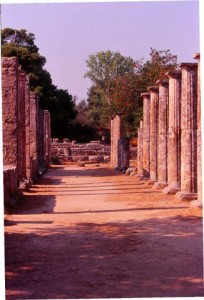
The Temple of Olympian Zeus still sported a few standing columns and is considered the second most important holy site of ancient Greece (behind Delphi).
We drove North toward Patra, where we joined a car ferry at Rio to carry us over the Gulf of Corinth to Antirrion.
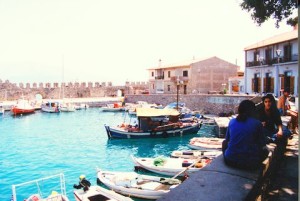
Once on the Mainland, we headed East, stopping in Nafpactos, a picturesque medieval port once settled by Venetians. Its harbor fronts an old Venetian castle high on the hill above. Stone walls extend around the harbor and provided us a charming place to rest and eat our lunch of cheese pies and sodas purchased in a nearby bakery. Back on the highway that skirted the Coast, we drove toward Delphi.
Delphi
Both an archaeological site and an interesting town of modern shops and restaurants, Delphi attracts many foreign visitors. We spent most of a day at the ruins of Ancient Delphi. Mythology was alive and thriving in that mystical place.
Located at the foot of Mt. Parnassos, ancient Greeks chose Delphi as their sacred site. The Sanctuary of Apollo was located in this place that was considered the center of the earth and is known forever as the center of worship for the god, Apollo, son of Zeus. Delphi eventually became a panhellenic sanctuary where athletes from all over competed in the Pythian Games, precursors of today’s Olympics. (www.greecetravel.com/delphi/)
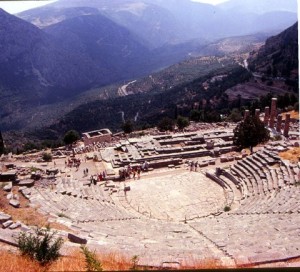
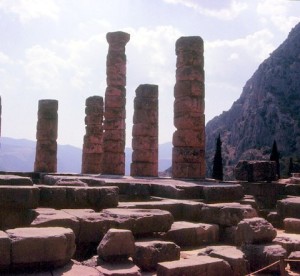
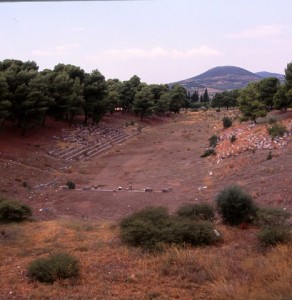
On the drive from Delphi back to Athens, we stopped in the small town of Arahova, famous for flocati rugs, honey, cheese and wine. A few dollars lighter and a couple of packages heavier, we drove away with a very nice handmade rug for Jim’s office and a silk wallhanging for me.
Back in Athens, we chose a two nights of luxury at the Intercontinental Athenaeum and dinner on the rooftop restaurant with breathtaking views of the colored lights on the Acropolis in the distance after the sun set.
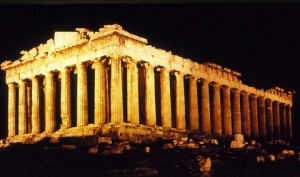
(Source of above photo unknown)
A lot depends on your preferences. We wanted the option to stay in local accommodations when possible, but we did upgrade to fancy digs at one point. Here are a few we like:
The Herodian
We booked a suite at a very reasonable rate with a bedroom looking up to the Acropolis. Imagine waking each day to the sight of the Parthenon! The hotel gave us breakfast and was located only a block to the Acropolis Museum and 5 minutes up the hill to the ruins. Several restaurants and cafes are located nearby and the walk to the Plaka wasn’t bad at all. Our suite was air conditioned and very clean. I checked their rates online and found them to be still affordable and highly rated on several sites. You can book directly from their website or from any travel agent. www.herodian.gr
Hotel Grande Bretagne
If it’s luxury you want in Athens, look no further. The Bretagne is elegant, sits right on Syntagma Square in the middle of all the action. Conde Naste Traveler rates the Grande Bretagne as one of the 100 Best Hotels in the world.
Intercontinental Athenaeum
Our time in Athens ended with 2 nights at this magnificent hotel. It’s off the beaten path and a long walk to Syntagma Square, but I managed it. Jim and Michael spent a day on the only golf course at that time in Greece, while I wandered alone downtown. We enjoyed 2 fabulous meals at the hotel’s rooftop restaurant with a glorious view of the Acropolis at night. The Intercontinental was expensive but deals can be found.
Amalia Hotels
Outside the city of Athens, we needed lodging in 3 different towns. I solved that problem by reserving our rooms at the Amalia Hotels in Nafplio, Olympia and Delphi. This is a local chain that has been around a long time. All 3 were spotlessly clean and very nice. The Delphi location also offered beautiful grounds and a large pool. The Amalia is still rated well and a reasonable option for lodging.
Carol’s Travel Tips
Car rental:
Reserve ahead and do so from home! Rental vehicles are hard to come by in the summer months. Be sure to take your confirmation information with you. Mistakes do happen.
When renting a vehicle outside the U.S., always take out their insurance. It may seem pricey at the time but trust me, if you should have an accident, it will be a lot easier to settle using their insurance company instead of yours. We have personal experience with that issue. We reserved a small car from Hertz and were very pleased with their service.
When to Go:
Greece is lovely in the spring and fall. We traveled in August and it was hot.
About that Foreign Language:
Learn a few Greek phrases and words. Buy a small English-Greek phrase book. Locals appreciate your efforts to communicate with them, even if your pronunciation isn’t perfect. The effort and a smile will go a long way. Use the phrase book to learn the symbols they use for public restrooms and road/traffic signs.
Driving Tips:
We found Greece easy to navigate, except for Athens. Major road signs were in Greek and English. Drive on the right, same as in the U.S. That phrase book I mentioned earlier is invaluable on the road, if it contains photos of road signs. Purchasing gas at petrol stations wasn’t a problem. Even if the attendants didn’t speak English, they were friendly and helpful.
Where and What to Eat:
In any country, restaurants come and go. Because of that, I won’t recommend specific places to eat in Greece, except to say that we enjoyed cafes and tavernas frequented by locals. Large hotels usually have at least one nice restaurant, but you can experience that at home. Expand your gastronomic viewpoint and go local.
That said, it does pay to learn a bit about Greek food before your visit. You can rarely go wrong with a Greek cheese pie or a spinach pie (called Spanokopita). Greeks are known for olives, feta cheese, locally-grown honey, and the freshest vegetables. No GMO’s here! Moussaka and souvlaki were favorite dinner dishes.
If you order Greek salads, do not expect them to be the same in Greece as in the U.S. Their salads are served heavy on the tomatoes, light on lettuce and usually with a good amount of feta cheese and olives. Mix your own oil and vinegar at the table.
For up-to-date restaurant suggestions, ask your traveling friends, try social media and check out Matt Barnett’s website for ideas. I don’t know if it has changed but at the time of our trip, ordering a steak in a smaller restaurant wasn’t a good idea.
A Final Word:
Greece is going through major economic crises in 2015. Here’s what you should know before you go about that subject: Over several decades, because of government policies that pushed overspending while relying on external loans to finance it, the fiscal crisis became uncontrollable as the national debt reached the point that the country could no longer borrow money. With help from the European Union, the most dire predictions of collapse were avoided. But Greece is still struggling. The standard of living dropped and unemployment is high. A deep recession remains.
Strikes, sit-ins and political turmoil exist, but the worst appears to be in the past. Avoid any political gatherings and mind your own business. When I was in Athens and walked downtown from the Hotel Intercontinental, I did get caught up in a teacher’s strike. I couldn’t get through the mass of strikers and I couldn’t move away from them. Fortunately for me, a gentleman nearby explained to me in broken English what was going on and helped me through the crowd into a nearby shop.
Do not discuss politics with locals. Instead, focus on their beautiful country or their wonderful history and architecture. Be a good guest. Be informed but not worried.
Leave a good impression. Many people in foreign countries expect Americans to be demanding. You can show them otherwise, by using a few words or phrases in their language, always expressing “thanks” or “please” and smiling. Greeks are very friendly and welcoming. You will be a fortunate person indeed, if a local invites you to a village celebration or wedding. Start conversations with locals whenever you have the opportunity. Ask polite questions. Show an interest in their culture and way of life, and you may be rewarded with invitations or suggestions that you cannot find in a guide book.
